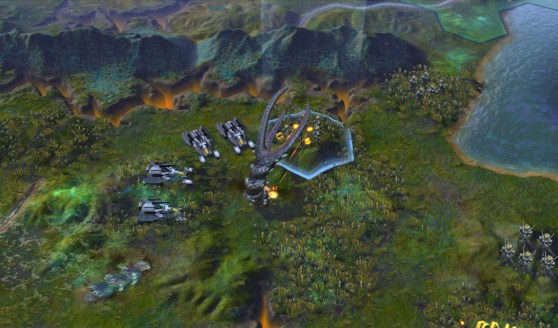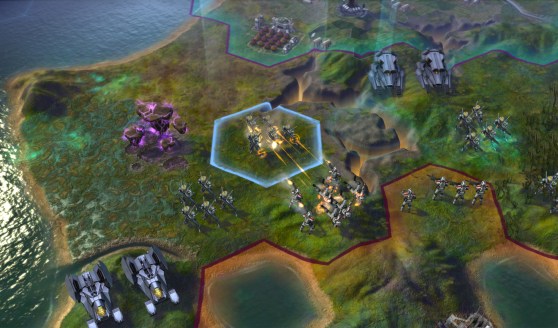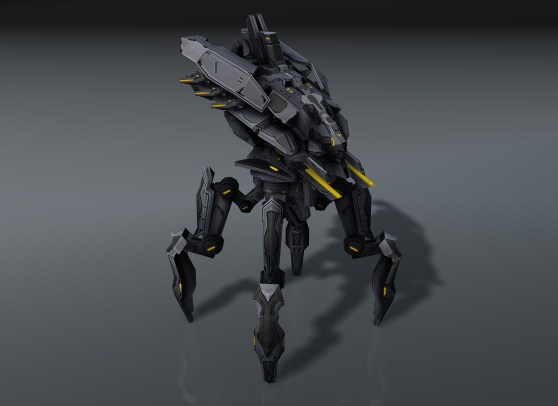Those darned moody, unpredictable aliens
Tech wasn’t the only thing they could blow up because of the sci-fi environment. Aliens gave Miller and McDonough the chance to introduce an unpredictable factor into the game, one that would react to the player’s movement and conquest but not always as a rival.
“The aliens in the game are the third players in this game,” Miller said. The intent: shake things up. In previous games you might run across always-hostile barbarians or other human factions you could fight or negotiate with (a mechanic that’s till present in the game.) But there is no negotiating with the aliens, and they won’t always attack.
“The aliens are prioritizing one agenda over another. As you act on the planet — expanding, grabbing territory — they will react very strongly to that,” McDonough said. “The aliens are very powerful, but they’re not there to win the game. It’ll be interesting to see how people react.”
Aliens also react to the NPC human factions, helping them to form ideas about what people are like. So even if you’re nonviolent toward your alien friends, if other human factions aren’t, the aliens may still retaliate against you, the pair said. And smaller aliens are animalistic, taking shots when they can.
“They’ll come after you. You have to treat them with some caution,” Miller said. “We never wanted people to be complacent.”
“The aliens will take their turns and change their minds,” McDonough said. “We put the player in a bit more aggressive posture at the beginning of the game. You are strangers in a strange land. The first chapter in Beyond Earth is about survival.”
That may force some players who favor diplomacy to choose firefights instead.
“The idea that you pivot and change your mind was one of our founding ideas and objectives with this game,” McDonough said.
Nuture or conquer? Quests help you choose
One way you’ll start to change your mind is through the quests, which pop up based on actions you take — exploration, conquest — and ask you to make choices about what you’ll do next. Some ask you to seek particular objectives or create specific units for rewards. Others ask you to decide what to do about a problem or discovery, awarding you a variety of rewards based on the choices you make.
What you decide to do in one quest helps direct what happens in the next — if you choose to drain a lake to get at an artifact, for example, you might then have to choose what to do with the artifact in the next quest.
“The decision tree is a pretty cool format,” Miller said. Quests and rewards randomly change, both in what you get and when they appear, from game to game. “It’s optional.”
“There’s an expectation that a game like Beyond Earth delivers a sci-fi story,” he said. The quests are one way the designers chose to tell it. “You can make those decisions quickly, but they still matter. They teach you to play the game, in the beginning, and give you one more vector for customization. No decision is bad.”
ANGELs vs. Rocktopi: the best units
One result of giving players so many ways to customize the game is the wide variety of units they can eventually choose to play. Each Virtue tree results in different units becoming available, based on whether you’re choosing to take advantage of the alien tech and abilities, to exterminate them in favor of your own, or to transcend current human tech in pursuit of robot-assisted nirvana.
Miller’s favorite unit is the Rocktopus, a unit that becomes available late in the Harmony tree (the one that uses alien technology). It’s formed around a float stone, effectively creating a giant jellyfish that players can deploy on the map or in the orbital layer, affecting a collection of hexes underneath it.
“I like aliens that bend the rules,” he said.
McDonough’s favorite was the ANGEL, which stands for Articulated Neurosymbiotic Gantry (Execution & Logistics). It’s a unit that becomes available late in the robot-based Supremacy tree, a mechanical walker with a spidery robot chassis powered by a human consciousness. It’s the Swiss Army knife of advanced units, he said.
Despite all of the fun new elements the pair included in Civ: BE as a result of the space/sci-fi environment, they’re quick to assure fans that Firaxis won’t make a Civ for every popular setting. They’ll use some ideas they got from Civ: BE in future games — on Earth.
“I don’t think we’re going to try to map Civ to a bunch of other genres,” Miller said. “We’ll always have a classic Civ offering. I doubt we’ll see Civ in Tights anytime soon.”
VentureBeat's mission is to be a digital town square for technical decision-makers to gain knowledge about transformative enterprise technology and transact. Learn More




